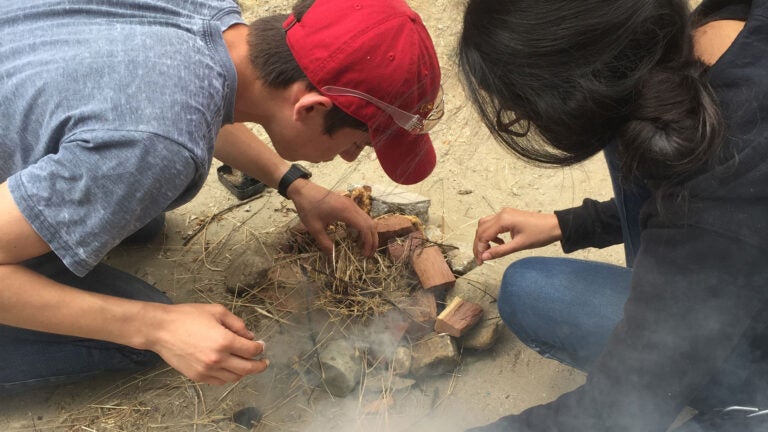
Premodern life and the tough old days of dyeing, weaving and smelting
USC Dornsife offers an offbeat course giving Trojans hands-on experience in age-old skills — and no matches are allowed
[new_royalslider id=”209″]
Making fire isn’t as easy as you think.
And neither is crafting ceramics, spinning wool, dyeing, weaving and copper smelting.
Those were just some of the unconventional activities taken on by 20 Trojans in “Exploring Ancient Ways of Living: Experimental Archaeology,” a Maymester course offered by the School of Religion at the USC Dornsife College of Letters, Arts and Sciences.
Led by Lynn Dodd, associate professor of the practice of religion, the month-long course, which included a three-day field trip to Catalina, let students explore premodern life by offering hands-on experience in ancient skills.
“The students jokingly call this course ‘How to Survive the Zombie Apocalypse,’ but what I want them to understand is the diversity of resources and skills that underlie everything that we take for granted in our lives today,” Dodd said.
Among the key components of that aspect are the human elements: planning, learning, communication, collaboration and cooperation. Students, Dodd noted, will never look at a knife the same way again after smelting the metal to make their own.
Premodern life: make fire or fail
Forbidden from using matches, students must master the ability to make fire using a fire stick to pass the class. The process is a lot harder than it looks on YouTube videos, Dodd noted — until students understand that collaboration is the key to success.
The process also teaches students to be attentive to group dynamics, different proclivities and ways of communicating.
“There are a lot of reflective assignments in this process,” Dodd said, “so they’re thinking about: How am I reacting? How are others reacting? How am I learning? How are these skills transmitted? What are different ways to learn?”
Forging steel
Under the direction of a professional blacksmith, students forge their own steel strikers from which sparks can be generated. This is an essential task on a course that teaches students how to make cheese, bread, candles and soap, all of which require fire.
One of the key concepts Dodd wanted students to grasp was a sense of the time and quantity of materials needed to make essential items.
By making their own mozzarella, students learned that a gallon of full cream milk yields a relatively small amount of cheese.
“As a result, people look at cheese in a different way and really think about what an incredibly potent source of calories and nutrition it is,” Dodd said.
A shared human past
Native American tribal members from the Tongva community shared their traditional food practices, such as roasting agave and grinding acorns and mesquite into flour.
Students were surprised by what is available in the environment, Dodd noted, from food and medicinal plants to materials to create fire, weave, dye and make cord — which was important for everything from sailing to horseback riding and making traps.
During their visit to USC Dornsife’s Wrigley Marine Science Center on Catalina, students were able to identify many of the plants and animals that supported people who lived on this island.
Although the students learned important survival skills, Dodd stressed that she wasn’t teaching a survival course.
This is an experimental archeology class — we are using traditional techniques to understand how we create knowledge about our shared human past.
Lynn Dodd
“Maybe someday I will, but this is an experimental archeology class — we are using traditional techniques to understand how we create knowledge about our shared human past. There’s real innovation in the fact that traditional ways of living can teach us something today.”
Bonding experience
Dodd said the course, which is open to all undergraduates regardless of major, is designed to provide a group bonding experience as well as an intense reflection process.
“As much as students come to understand how we create knowledge about how we, as a human species, have developed, innovated and survived, they’re also learning about themselves and about ways that they can succeed in the future,” she said.



